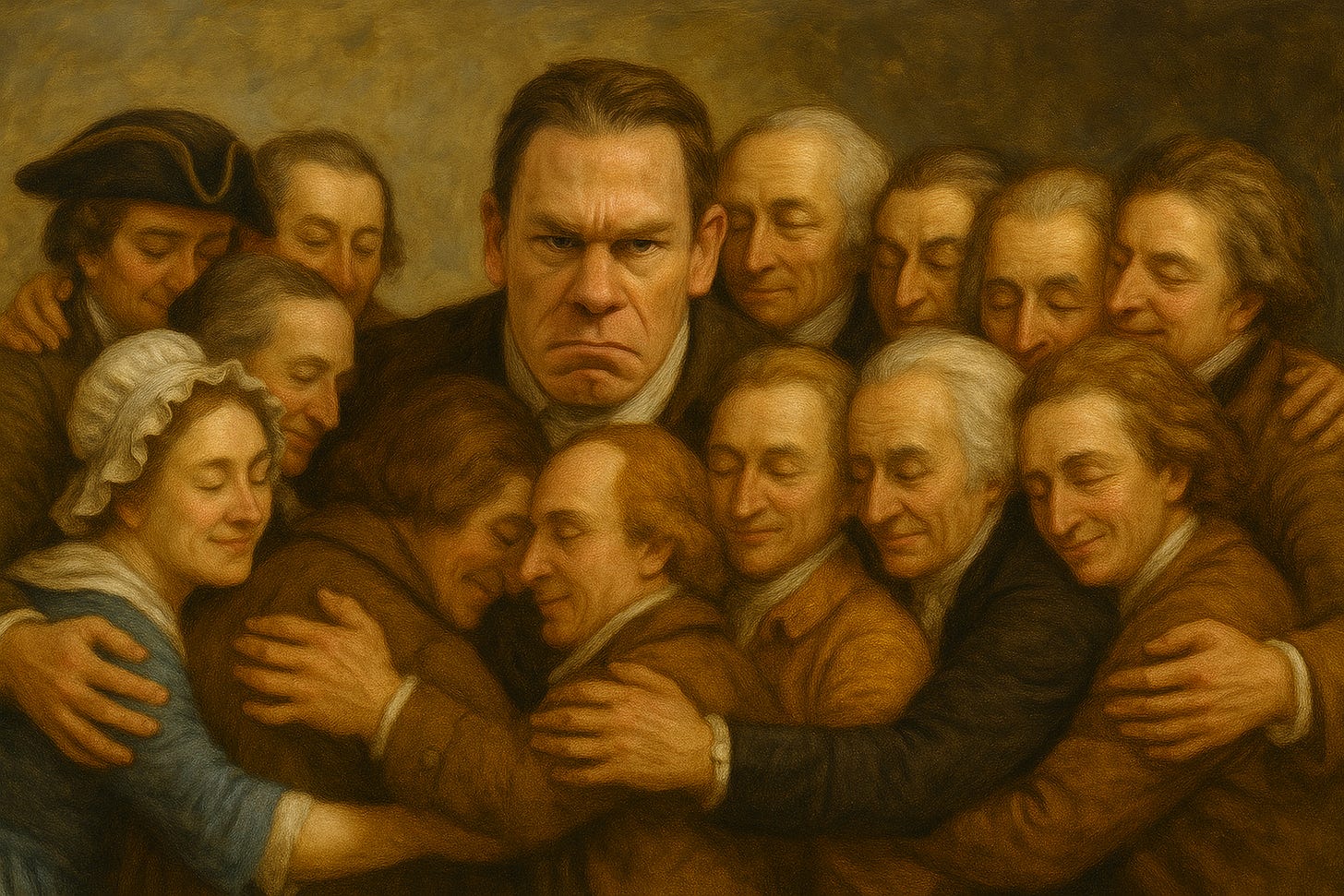The Federalists Reloaded | No. 6
Hamilton vs. the Heel Turn
Wrestling and politics share more than just theatrics. They both thrive on spectacle. They both ask for loyalty. They both hinge on storylines that blur the line between reality and performance. And every now and then, both deliver a heel turn so jarring it forces you to rethink everything you thought you knew.
Professional wrestling isn’t just a guilty pleasure; it’s a reflection of how power operates in real life. There’s always a character playing the good guy, someone cast as the villain, and a crowd ready to cheer or boo depending on which way the wind blows. And behind the curtain, there’s always someone shaping the script.
Sound familiar? That’s politics.
It’s also the entire premise of Federalist No. 6. In this essay, Alexander Hamilton makes the case that even in a republic, people are driven more by ego, ambition, and resentment than by principle or peace. Conflict is inevitable and unity is fragile. Good intentions only last until someone sees a shortcut to power.
And if we need a good wrestling parallel, look at John Cena. A man built on “Hustle, Loyalty, Respect,” who just flipped the script and walked out of the ring with a smirk and the message: “U Can’t See Me.” For twenty years, Cena was the Hamiltonian ideal of order and civic virtue. Until he wasn’t.
That turn, that moment when the hero becomes the problem, is exactly what Hamilton warned us about. And it’s why professional wrestling might just be the perfect metaphor for understanding American politics, both then and now.
Hamilton’s Opening Move: Drop the Illusion
Hamilton comes off the top rope almost immediately.
“To look for a continuation of harmony between a number of independent, unconnected sovereignties in the same neighborhood would be to disregard the uniform course of human events.”
He’s not just skeptical of peace between states; he sees it as a delusion. The idea that sovereign states will cooperate out of mutual interest? Suspended disbelief works in wrestling. In governing, it’s a death wish.
He knows that as soon as ambition enters the ring, alliances crumble. And he knows the crowd never sees it coming.
“Commercial republics, like other governments, are administered by men who are subject to like passions for resentment, avarice, and ambition.”
You think republics are special? You think shared ideals and trade will prevent war? Hamilton slams that belief like a steel chair to the face. In his view, passion always outweighs policy. And unity without structure is just wishful thinking.
The Cena Parallel: When Loyalty Runs Dry
John Cena spent twenty years insisting on three words: Hustle. Loyalty. Respect. He was the moral compass, the steady hand. He was what Hamilton would call the myth of the virtuous republic, selling the idea that good guys, once established, stay that way.
But all it took was a shift in energy. One too many “Let’s Go Cena / Cena Sucks” chants and no appreciation for his pending retirement. Suddenly, Cena wasn’t saluting the crowd; he was sneering at them.
That’s Hamilton’s point. No system, no leader, no republic is immune to the gravitational pull of power and resentment. Cena didn’t turn heel because he was secretly evil. He turned because that’s how the world works when checks fail and loyalty frays.
Even the guy in jorts has a breaking point.
In case that felt too abstract, Hamilton brings receipts. Athens and Sparta were republics that spent thirty years tearing each other apart. Rome was a republic until the stabbing started. Even the Dutch Republic, better known for tulips and cheese, couldn’t keep its own house in order.
So no, Hamilton says, don’t expect America’s states to do any better. They all started with “respect” and ended with a pile of broken alliances.
The Founders Watched the Locker Room Implode
At the Constitutional Convention, unity was already on life support. States were taxing each other, printing their own money, and threatening war over disputed western land.
The Annapolis Convention in 1786? Half the states didn’t even show. Then Shays’ Rebellion hit, and it became clear the Articles of Confederation couldn’t even stop farmers with pitchforks, let alone a foreign army.
Hamilton saw the writing on the wall in neon lights: no central referee, no strong union, no stability.
He looked at the chaos and said, “We’re all one surprise heel turn away from disaster.”
The Anti-Federalists Weren’t Buying
But not everyone was sold on Hamilton’s plan. To the Anti-Federalists, he sounded less like a realist and more like a control freak. Brutus and Federal Farmer? They were the purists, the kayfabe loyalists.
They believed sovereign states could cooperate through treaties, shared interests, and mutual respect. They didn’t want a central authority with a big belt and a bigger ego.
“History does not show the calamities of confederacies, but the tyranny of consolidated governments.”
Patrick Henry, never one to waste a spotlight, added:
“Give me liberty, or give me death! But tell me not that our safety requires the sacrifice of our sovereignty.”
They feared that what Hamilton was building might one day fall and take every state with it.
What Happens When You Ignore Hamilton? You Get Booed by Your Own Crowd
Hamilton’s words were prophetic. By 1869, the Supreme Court had to weigh in with Texas v. White, ruling that states could not secede and that the Union was permanent.
“The Constitution, in all its provisions, looks to an indestructible Union, composed of indestructible States.”
That’s just a more polite way of saying what Hamilton tried to shout: “You’re in this whether you like it or not.”
Now, in our time, governors threaten to ignore federal courts. States sue each other regularly. And cable news profits off every punch.
We stopped defending unity and started treating it like a gimmick. If we don’t change things soon, we’ll work ourselves into a shoot.
So What Do We Do? Put the Belt Back on the Constitution
Hamilton wasn’t just trying to scare us. He was trying to save us from ourselves. Here are five steps we can take now to avoid becoming the world’s most dysfunctional tag team:
Bring Back the Advisory Commission on Intergovernmental Relations
Congress killed it in 1996. Bring it back. Restore real dialogue. Give governors and mayors a seat at the table with Congress and federal agencies. Let them hash out policy before it turns into political theater.
Support Shared Infrastructure Projects That Cross State Lines
Broadband. Water. Energy. Transportation. Fund it long-term, not just with one-off grants. Projects like the Appalachian Development Highway System and the Midcontinent Independent System Operator (MISO) show what happens when states play on the same team.
Cool the Lawsuit Arms Race Between States and the Feds
Lawsuits as political theater aren’t governance. Reform incentives to resolve conflict earlier. Give federal courts more tools to push back on frivolous suits designed to generate press releases, not outcomes.
Stop Entertaining Secession Fantasies
The Constitution settled this. You don’t get to rage-quit democracy. Push civic leaders and media outlets to stop amplifying unserious secessionists. Elevate adults who can disagree without destroying the furniture.
Teach the Constitution Like It Matters
Resurrect the Civics Secures Democracy Act. Fund real civic education. Stop the TikTokification of our knowledge base. Invest in high-quality teacher training, local history partnerships, and classroom debate programs that build a durable understanding of constitutional order.
And here’s a bonus one:
National Service as a Bridge, Not a Buzzword
You want to fix division? Make people work alongside someone from another ZIP code. Not online, but in person. In service to something bigger than both of them.
Groups like Service Year Alliance and Voices for National Service have been pushing to expand AmeriCorps and similar programs. These efforts build what Hamilton called “the cords of affection.” We could use more of those.
We don’t need to wait for Washington to get its act together, but we can encourage and promote volunteerism, especially among young people.
Final Bell: Hamilton vs. the Heel Turn
Hamilton wasn’t warm and fuzzy. He didn’t write for comfort. He wrote to prevent disaster. And Federalist No. 6 is one of his most brutal, clear-eyed essays.
His point is still true: Peace is not the natural state of republics, and unity is not automatic. The more we take it for granted, the more likely we are to lose it.
So the next time someone shrugs and says, “This country’s too divided to save,” remind them what Hamilton was saying.
When John Cena turned heel, the crowd gasped.
Hamilton? He saw it coming.
“U Can’t See Me” was always a warning.






Great list of suggestions to increase healthy interdependence. I would add another. I am intrigued with the work of Professor James Fishkin of Stanford University on deliberative polling. The concept reminds me of jury duty except instead of deciding legal issues, citizens would learn how to help shape public policy.